Malone Hotels

Where the horse-buyer was known to be the night someone was robbed of money paid them for the purchase of horses.
 It was by moonlight that we first beheld the active, wide-awake, enterprising little place called Malone; and, as we gazed at the handsome depot which received our shrieking engine, and admired the noble proportions of the scarcely completed hotel just opposite, we came to a unanimous conclusion that if the Malonians, as a body, failed in any undertaking, it would not be for lack of ambition. – The Malone Palladium, July 29, 1869.
It was by moonlight that we first beheld the active, wide-awake, enterprising little place called Malone; and, as we gazed at the handsome depot which received our shrieking engine, and admired the noble proportions of the scarcely completed hotel just opposite, we came to a unanimous conclusion that if the Malonians, as a body, failed in any undertaking, it would not be for lack of ambition. – The Malone Palladium, July 29, 1869.
Farmer Boy opens in January 1866, “sixty-seven years ago” from when the book was published in 1933, and it covers a year in the life of Almanzo Wilder, who celebrates his ninth birthday in Chapter 5 of the novel.
The only time a hotel is mentioned in Farmer Boy is in Chapter 13, “The Strange Dog.” In the spring of 1866, Father Wilder sells a team of horses for $400 to the lavishly-dressed horse-buyer, who paid Mr. Wilder $200 in cash and would give him the remainder when the team was delivered to the buyer in Malone the next day. Mother Wilder hid the money in the house because it was too late to take it to the bank that day, and that same night, a strange dog appeared. Almanzo’s sister Alice felt sorry for the stray dog, and fed him. The dog hung around the Wilder farm afterwards, and during the night, the dog’s growling woke the family. The next morning, Mr. Wilder found the boot-tracks of two men near the house; the men had apparently been scared away by the dog. As someone near Malone had been recently been robbed of money paid to them by the horse-buyer, it was suspected that the horse-buyer was in cahoots with the gang of thieves, but as the horse-buyer was known to have been at the hotel in Malone that night, he had an alibi that kept him from being linked to the thieves.
Although Franklin County newspapers often reported the arrival of named horse-buyers in Malone or other towns in the county, no story of a robbery fitting the description in Farmer Boy in the late 1860s could be found. In the book manuscript, the robbery was said to take place the same night that the Wilders have money from the sale of horses in their home. It is implied that the robber occurred near the Wilder farm in Burke, as they learn of the story from the robbed man himself who was, as he rides by the house on his way to Malone to notify the sheriff.
There is no mention of a hotel in the manuscript, either in Burke or Malone, but it’s interesting to look at what hotels there were in Malone at the time Farmer Boy takes place because of their connection to Little House characters and the Wilders.
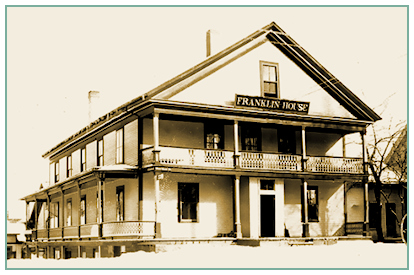
Hedding Chapel, converted to Franklin House
The James Wilder family attended Methodist Episcopal Church services in Malone, held at Hedding Chapel, which was built in 1838. The $3000 church was located on the northeast corner of West Main and Fort Covington streets. The building was 35 by 40 feet, a wooden structure with a stone basement. In 1863, the site for a new sanctuary on Main Street was purchased, with construction was begun in 1866 – the same year Farmer Boy begins – and the $44,000 church sanctuary was completed and dedicated August 21, 1867, with the Rev. Samuel Call as pastor.
David Fields leased the old Methodist Church building (Hedding Chapel) from its new owners, remodeling it into a two-story boarding house and opening it to both regular and transient boarders. It was divided into parlors and sleeping rooms, with a basement kitchen and dining room. Prior to 1920, the building was enlarged and widened, the original boarding house integrated into the new construction; it was opened as a hotel called the Franklin House.
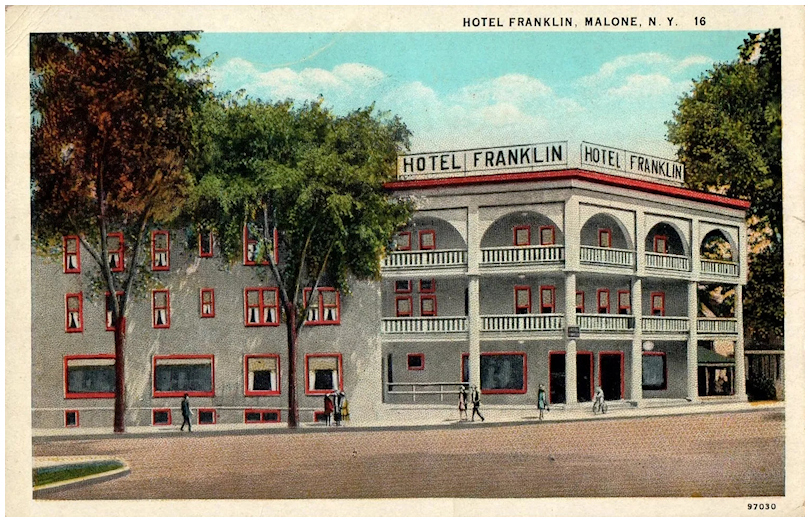
Postcard of Franklin Hotel like the one Rose sent to her parents in October 1932.
In October 1932, Rose Wilder Lane took the money she’d earned from the sale of “Let the Hurricane Roar” as a serial to be published in Saturday Evening Post, and she took a road trip from Mansfield to New York City, stopping for a couple of days in Malone to acquaint herself with where her father had spent his childhood. Rose no doubt did so in order to make some changes to her mother’s Farmer Boy manuscript, which had been refused by Harper & Row the previous month. Rose sent her parents a postcard of the hotel, on which she described the Franklin as a “grand hotel, very smart and modern.” The Franklin Hotel was razed in the 1990s.
The original Franklin Hotel was located on Main Street opposite the depot and overlooking what Almanzo called “The Square.” No photos of this early hotel have been found. The brick building at the corner of Main and Elm streets burned down on January 20, 1866, when the old Hosford Hotel behind it (occupied by a number of businesses at the time) caught fire. High wind spread the flames and embers to neighboring homes and businesses on the block or operating out of the hotel’s lower floor. William Hogle, who had rented the building and was running the Franklin Hotel at the time, suffered a loss of $5,000 in furniture, provisions, and fuel.
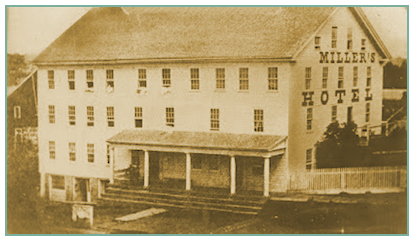
Miller’s Hotel
Another hotel, Miller’s Hotel, was located on Main Street just west of Elm Street (and the Square) and east of the Salmon River bridge. It was just south of the depot and had been in operation even before the railroad came through Malone and the depot was built in the 1850s. Originally built as the home of W.D. House, it was purchased by Orlando Furness and enlarged, and it was first operated as a hotel by Furness’s son-in-law, Philip B. Miller. In January 1865, Miller’s Hotel was purchased for $15,000 by Alexander R. Flanagan, who was running the hotel at the time. Flanagan’s wife, Mary, was landlady, and their three adult sons (William, Charles, and Samuel) worked in the hotel.
If one sticks to the timeframe of Farmer Boy (January 1866 through January 1867), and the horse-buyer / stray dog story is true, the “hotel in Malone” where the horse-buyer stayed would likely have been Miller’s Hotel.
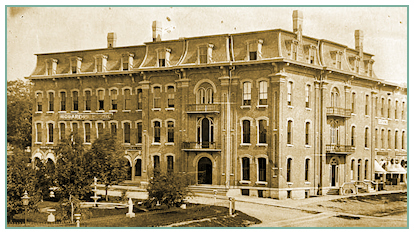
Ferguson House, after it was renamed Howard House.
The Ferguson House was built on the site of the original Franklin Hotel that burned; it was a four-story brick block with distinctive mansard roof that housed not only the hotel rooms and parlors, but an opera house, bank, and numerous offices and retail businesses. In the early 1880s, Alexander Flanagan leased and ran Ferguson House, and he converted Miller’s Hotel into a block of businesses. He and his family lived in the hotel.
In January 1886, the Ferguson block was purchased by Oliver Howard for $75,000, and the name of the hotel changed to Howard House. Two years later, on January 29, 1888, the Howard block, including the Howard House and fifteen places of business, was destroyed by fire, just as the previous hotel on the site had burned twenty years earlier. The hotel had been insured for only $22,000. Oliver Howard died suddenly in July 1888; at the time, he was preparing to rebuild, and work on the new M.E. Howard Block soon began, with the foundation and walls nearly finished by the end of August and the offices and stores were occupied and the hotel in business by early 1890.
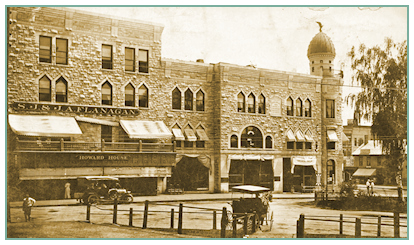
The new Howard House, run by Samuel and John Flanagan.
The Malone Post office moved into a 52 x 32 foot space that was in the location of the old hotel’s sitting room, at the corner of Main Street and Park Place, the road that ran in front of the building between it and The Square. Early occupants included a meat market, tin shop, flour and feed store, clothing store, law offices, I.O.O.F. lodge, insurance agent, general store, barber shop, and physician. Alexander Flanagan was proprietor of Howard House until failing health made it necessary to turn the business over to his sons Samuel and John. Alexander Flanagan died at Howard House in July 1894. The Howard block burned in the 1970s.
The old Miller’s Hotel building had been torn down in 1886, and the site stood empty until Samuel and John Flanagan built the Flanagan Hotel there in 1912. The premiere hotel had stores and restaurants, and housed permanent residents as well as hotel guests. The hotel burned in August 1997; just the shell of the building is still standing as of this writing.
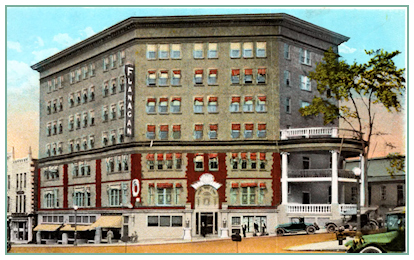
Hotel Flanagan.
The map below is pieced from the 1884 Sanborn Fire Maps for Malone, New York, showing a portion of five blocks on the north side of Main Street between Fort Covington Street and the buildings east of Elm Street. Click image to enlarge. Some properties have been lettered A through F. Historically, these were:
A – Hedding Chapel (Methodist Episcopal Church), converted in the 1860s to the second Franklin Hotel. Became a part of the enlarged Franklin Hotel in the 1920s. The building and land were auctioned of in 1992 and torn down. There is an unoccupied building (with the address: 5 Fort Covington Rd.) currently on the site.
B – Centenary Methodist Episcopal Church built in 1866; dedicated in 1867. Now Centenary United Methodist Church, 345 West Main Street.
C – Miller’s Hotel, torn down in 1886. Hotel Flanagan built on this site in 1912. Burned in 1997. Shell of building at the northwest corner of Main and Elm streets.
D – Original passenger depot; passenger service stopped in the 1950s. Now houses bank and law office.
E – Public Square.
F – Site of first Franklin Hotel; burned in 1866. Ferguson House built on site in 1886; became Howard House, and burned in 1886. Rebuilt as Howard House and business block; burned 1907.
G – Hogle House: James L. Hogle was running the original Franklin Hotel when it burned down in 1866. Shortly after the year described in Farmer Boy, he and his brother built Hogle House on the corner of Main and Academy streets, catty-cornered from Centenary Methodist Episcopal Church. J.L. Hogle later built Elmwood House at the corner of Main and Pearl. In 1903, Hogle House changed hands and the name changed to Cushman House; in 1907, the name changed again to Smith House, under which it operated for many years. No longer in use, a portion of the three-story brick building collapsed in 2011 and the building was razed.
There were other hotels in Malone throughout the years; the ones mentioned here are included because of their connection to people, events, or locations mentioned in Farmer Boy. It is not known where Rose Wilder Lane stayed during her visit to Malone in 1932; she only recorded in her budget book that she paid $2 for her room on October 8 and that she paid 53 cents postage for items mailed.


hotel in Malone (FB 13)

